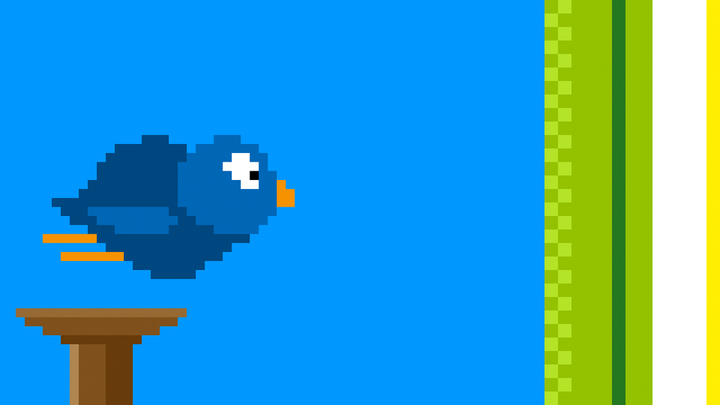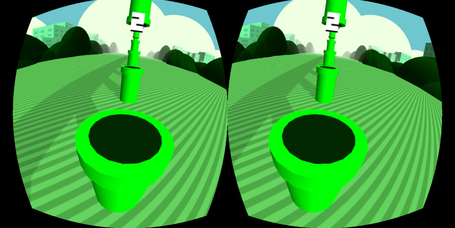
Ever since Dong Nguyen pulled his game down off the mobile stores due to extreme level of spam/hate on his twitter account, along with endless words written about the game. In spite of this, indie devs have decided to band together in a indieJam.
The latest game dev jam is Flappy Jam, which sees indie developers getting together in an effort to show support for each other in the game development community.
"Envy and teasing should not belong to our community," the website states referring to the controversy of Flappy Birds. "Nor be a cause of suffering."
So far 44 games have been created inspired by the Flappy Birds phenomenon for this jam, and you have until February 24 to submit your own take to be part of the collection. To make a Flappy Jam game, it needs to be hard to an almost unplayable state, and use assets inspired (not ripped off) from classic games.
Most of the games will run right in your browser, and there's at least one designed for use with the Oculus Rift.
The Phenomenon
Regardless of how Flappy Bird came to be on the top of the app charts, the fact remains that masses of people played, enjoyed and discussed the game. There was something there that grabbed the imagination of a wide audience. What made the game so unique?
Terry Cavanagh used the aesthetics of his sublime Super Hexagon to create a game called Maverick Bird, and added the music of Kozilek for good measure. The mechanics are similar to Flappy Bird, but what little theme was there has been stripped away, leaving only stylized representations of the player and obstacles.
It’s also a whole lot of fun.
Maverick Bird may seem like a clone of classic games like Helicopter or even contemporary games like Jetpack Joyride, but the "flap" action is what sets it apart. You don’t hold a button to go up and let go to sink, you have to constantly hit the "flap" button to move in a parabola. The need to keep track of that angle, and to continually decide when to push and to know where that action will send you is the trick. It’s not easy, but Cavanagh decides to loosen up the hitboxes significantly; his take on the premise isn’t nearly as punishing as the original.
I HAVE TO WONDER, IS THIS CONSIDERED CANON?
This is why the Flappy Jam has been so worthwhile, even if it sometimes seems as if indie developers deal with most kinds of stress or controversy with a game jam of some kind. This journey to figure out why people were playing the game, and then to put their own spin on it, has led to some rather brilliant games.
Flappybalt comes from Canabalt creator Adam Saltsman, using that game’s visual language. Instead of a flowing level, Flabbybalt holds you in a rectangle with a spiked floor and ceiling. You have to bounce off the walls, while avoiding spikes that move up and down. Again, the game forces you to deal with that parabola, and to have a sense for how the character moves. It demands precision, and so far my high score is only six. This is another simple game that uses the basic ideas of Flappy Birdbut turns it into something a bit more interesting, almost claustrophobic, but much more enjoyable.
CREATION THROUGH LIMITATION
And this is why jams have such worth for developers, and why they often seem like a go-to solution for so many things. It’s useful to look at a game like Flappy Bird and strip it down to its component parts, to try to figure out what makes it enjoyable, and to then to play with those ideas to see what comes out the other end. Cloning a game for profit is one thing, but this is the equivalent of covering a song while putting your own spin on it; a process that often teaches the listener more about both the source material and the artist recording it.
I’m not sure Flappy Bird could ever work as a Twine-based text game, but I’m also sure the person who created it found out. I’ve seen plenty of people on social networks roll their eyes at the idea of a Flappy Bird Jam, or say they’re tired of hearing about it at all, but I have trouble being cynical about the process when the end result has been so fascinating.Heck, Sesame Street got in on the action, and Flappy Bert is worth a try just for the audio samples. Hit Space to Flap is also fun, at least the first time. The joke gets a bit old after that.
Floculus Bird, a virtual reality version of Flappy Bird that’s played with the Oculus Rift, is much more interesting. You’re still flying on a 2D plane, but you can look to the left and the right, and above and below you, and the feeling of actually being a bird flying on a 2D path through the pipes from Mario Bros. is one of the stranger experiences one can have in gaming.
The game also keeps the punishing hitboxes from the original, so you lose if you so much as touch any of the pipes. This creates a crazy sensation of having to constantly be looking both above and below you as you flap through the pipes; you need to make sure there is always clearance in both directions. You bob your head up and down, up and down, while flapping in that cursed parabola, trying your best to avoid hitting the pipe.
It’s not fun, not with hitboxes this unforgiving, but I’m not sure it’s supposed to be fun. I’m not sure if Flappy Bird was ever fun. But it’s interesting. The way my head moves is weird, and it’s a byproduct of what the game asks me to do. I’ve finally found out where all the pipes are coming from in the sky (there is one big, long pipe up there and the rest come down from it) and what is to the left and right of the screen (round green hills and what look like apartment buildings) but then I have to wonder, is this considered canon?
The idea of a canonical Flappy Bird actually went through my head as I made notes about these games, and it was too silly not to share. The story of what happened and why when it comes to Flappy Bird is still being told, but I’m just glad smart people who make interesting games found an excuse to explore a game that many people seemed to find beneath contempt.
The act of trying to figure out why people like something is always more fulfilling than condemning them for that enjoyment, and that seems to have been the purpose, and ultimate success, of the Flappy Jam.


